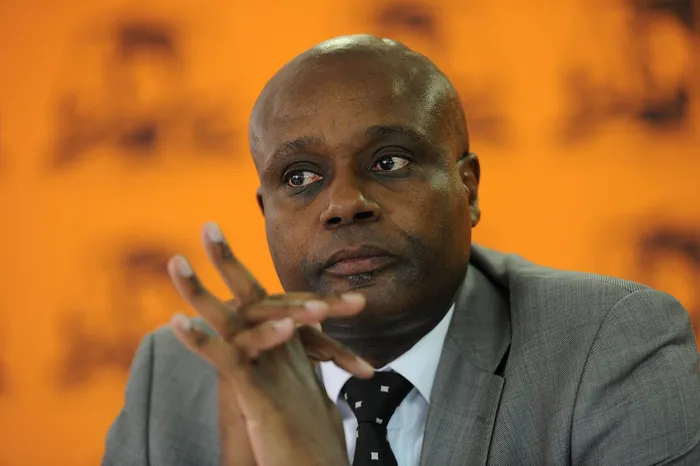
NDPP Shamila Batohi outlines how Chauke ignored prosecutors’ advice, overlooked critical evidence and failed to reinstate serious charges against Mdluli, telling the Nkabinde inquiry his decisions contradicted court findings and undermined proper prosecutorial conduct.
Image: Supplied
National Director of Public Prosecutions (NDPP) Shamila Batohi has told the Nkabinde inquiry that Gauteng Director of Public Prosecutions (DPP) Andrew Chauke “did not act as a reasonable prosecutor” when he withdrew murder and related charges against former Crime Intelligence boss Richard Mdluli despite overwhelming indications that the case should have proceeded.
Batohi is testifying before the inquiry chaired by retired Justice Elizabeth Nkabinde, assisted by Advocate Elizabeth Baloyi-Mere and attorney Matshego Ramagaga, with Evidence led by Advocate David Mohlomoynane SC.
She stated that she relied on affidavits, court documents, and other records because she did not have personal knowledge of all events, and explained that her affidavit had been prepared under severe time constraints.
Batohi said the charges against Mdluli arose from allegations dating back to 1998, including murder, attempted murder, kidnapping, intimidation, assault, and defeating the ends of justice relating to the killing of Tefo Oupa Ramogibe.
She summarised evidence compiled by the investigating officer, Colonel Kobus Roelofse, saying it showed “a history of threats, intimidation and violence” linked to Mdluli’s opposition to Ramogibe’s relationship with the late Tshidi Buthelezi.
She told the panel that Mdluli was arrested in March 2011. In November that year, his lawyers made representations to Chauke claiming a conspiracy by senior police officials.
Despite this, she said, Chauke’s own prosecution team, led by Advocate Zaais van Zyl and Public Protector Kholeka Gcaleka, advised that the evidence was “strongly supported” continuing the prosecution.
“The team was of the view that a solid circumstantial case existed,” Batohi told the inquiry.
However, Chauke withdrew the charges in February 2012 and referred the matter to an inquest. Batohi said: “One would have expected that, in the face of such serious allegations and given his own prosecutors’ advice, the DPP would proceed with the case. Instead, he withdrew it.”
She explained that Freedom Under Law (FUL) challenged the withdrawals in court, leading to a detailed judgment by Judge John Murphy in September 2013.
Batohi read extracted passages into the record, saying Murphy found that the inquest magistrate had accepted the core evidence implicating Mdluli but delivered “incoherent and contradictory” conclusions.
According to Batohi, Murphy held that the affidavits “supported a conclusion that there was indeed a prima facie case against Mdluli,” and that the inquest magistrate’s final statement that there was “no evidence” linking him to the killing was “wrong and inconsistent” with the rest of his reasoning.
She said Murphy also criticised Chauke for “simply ignoring” incriminating evidence in his court papers. “Instead of engaging with any of it, he claimed there was no evidence implicating General Mdluli, when clearly there was,” she told the inquiry.
Batohi then read the court’s order into the record, emphasising the direction that Chauke and Specialised Commercial Crimes Unit, Advocate Lawrence Mrwebi, reinstate all criminal charges “forthwith” and ensure the cases were prosecuted diligently. The SAPS was similarly ordered to reinstate disciplinary charges.
She said: “After a judgment of that nature, one would expect a reasonable DPP to reassess his decision, accept the court’s findings, and instruct that the prosecution continue. That is what the constitutional duty to prosecute without fear, favour or prejudice requires.”
Instead, she said, the NPA appealed the judgment. When asked who made that decision, Batohi said she did not know but assumed Chauke “would have recommended it to the NDPP at the time.”
She added that the decision to appeal was “difficult to understand” given the clarity of the inquest record and Murphy’s findings.
Throughout her testimony, Batohi maintained that the evidence available at the time supported prosecution and that Chauke’s actions were inconsistent with the prosecutorial policy.
“The record shows that he ignored the recommendations of his own prosecutors, he relied on an incorrect understanding of the inquest findings, and he took no steps to reinstate the matter even when the court set his decision aside,” she said.
hope.ntanzi@iol.co.za
IOL Politics
Related Topics: